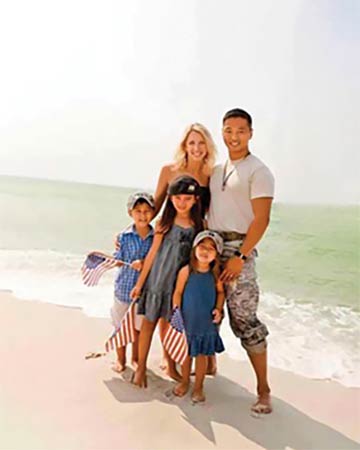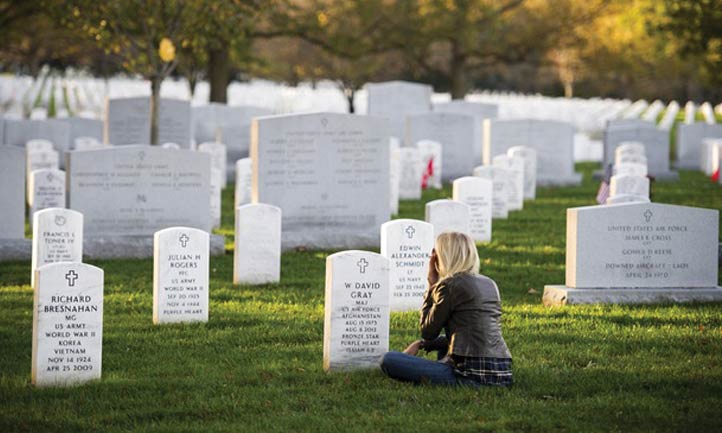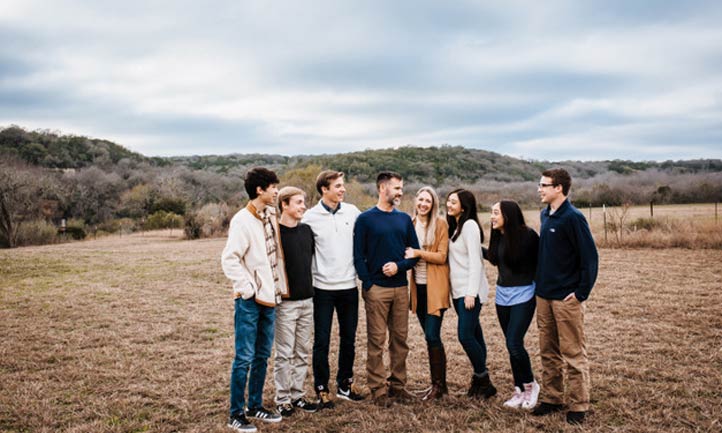Loving Two Men at Once
Author: Heather Gray Blalock
I assessed my hair and makeup in the rearview mirror one last time and took a deep breath as we exited the car. The kids had scribbled “Welcome Home” on the back side of a roll of wrapping paper and were taking turns whacking each other with it. In the mad dash for the airport, we had forgotten the American flags we normally bring to homecomings, and I chided myself for not being better prepared. My fiancé was coming home from deployment, and we were weeks away from joining our two families together as one. I had envisioned elated pomp and circumstance, so I really wasn’t certain what was happening in my heart and mind instead.
The kids unrolled their "banner" and stood waiting for Jack to come out of the airport terminal. With six kids between the two of us, it struck me as odd that only my two youngest were present...two were in Montana with extended family, and two were at piano camp. Right before his soon-to-be stepdad walked out, my son looked up at me, eyes glistening with tears, and said, "I wish Daddy had come home too." There it was. The arrival of the stabbing pain of grief made tangible the reason I couldn't be as joyful as I wanted to be at Jack's homecoming. This homecoming couldn't replace the one we never got to have. Four years prior, my husband, Air Force Major David Gray, was killed by a suicide bomber while deployed to Afghanistan. Our reunion would have to wait until we were all in heaven one day. Jack, also an Air Force officer, exited the terminal looking handsome in his uniform. We all hugged and smiled, and strangers thanked us for our service. It was at that moment I fully recognized my new reality. I'm in love with two men at once.


While there is a definitive start to the grief process, most widows or widowers will tell you there is no definitive end — even when you find yourself having feelings for someone new. Even now, almost 11 years after my husband's death and having been remarried for six years, something that reminds me of David can trigger a grief response. Grief has a way of sneaking up on you like a bad surprise party when you least expect it. But there is hope. While the intensity of grief doesn't necessarily change, time has allowed me the ability to simultaneously grieve the loss, joyfully cherish the memories, as well as grow and expand my heart to accommodate new love for another.
Though the crisis or trauma itself passes, the emotions that trigger grief and their impact do not. We must work to normalize this occurrence. Marriage and family counselor, Lindsay Pipes, underscores the importance of recognizing and validating the emotions widows and widowers experience after loss. She encourages those seeking to come alongside the grieving to take an approach that is conducive to the expression of varied grief responses. "Support networks should understand that emotions are there for a good reason," she told me in a recent conversation. "Give the bereaved person the space to ask for what they need, but also be aware that they may not know what they need, and anything you do might possibly trigger a grief reaction. But that's OK. There is no ordered process. It looks different for everyone."
This varied emotional response also applies to romantic feelings. Some may be tempted to feel it is a betrayal to their deceased loved one to engage in new romantic relationships or worry that others will interpret new intimacy to mean they no longer love the deceased. For most Gold Star Spouses, neither of those assumptions is true. Because I was widowed at age 32 with three small children, I think I knew in my heart that I would one day want to remarry. Not because I was "over" David — I'll never stop loving him, but because I believed my heart would one day grow to love another in addition to David because our marriage taught me how to love well, and I couldn't help but do so. I knew that if I chose to remarry, the man would need to not be threatened by or uncomfortable with my continued love for David. I also knew that could be a potentially complicated tangle of emotions and logistics.
Remarriage for young, abruptly bereaved widows or widowers presents dilemmas not experienced in other types of loss and remarriage. The death of a partner often involves placing that person on a pedestal or remembering only the good. Romanticizing the reality of the past relationship has the potential to create an intimidating third figure in the subsequent romantic relationships of the surviving partner. Indeed, most post-bereavement relationships take on a triadic nature, with the bereaved spouse continuing bonds with the deceased. Those bonds may look like the continued use of the deceased's last name in addition to the new married name, wearing the wedding ring on the opposite hand, or the continued display of photos of the deceased in the new home. These are more symbolic means of expressing the bond of love that even death cannot break, yet, amazingly, they don't inhibit the ability to experience new love. That is exactly what I discovered during Jack's homecoming.
My heart swelled, and I felt complete when Jack embraced me in that airport terminal. But my heart simultaneously ached to feel David’s strong arms around me again too. I couldn’t speak the entire way home as I drove us to the house we had recently purchased together — the house I had been working feverishly to have ready before Jack’s return. But when we got to the doorstep, I couldn’t hold it in any longer. The grief slammed me like a tidal wave.
Countless times I’ve said to others that Jack will never replace David. Just like I will never take the place of beautiful Aana, the wife of Jack’s youth. She fought a valiant, but losing, battle against the cancer that eventually robbed them of the life they had envisioned. That became incredibly apparent as I wept in Jack’s arms, unable to cross the threshold until the grief ebbed. When a grief wave hits, all you can do is cling to those around you and hold on till it subsides. Once I caught my breath, I looked up into Jack’s beautiful blue eyes, and all felt right again. The sharp ache over David’s loss began to dull and receded back to its normal state of being. I call it that because the ache of loss never goes away completely.
Lindsay Pipes stressed that the suppression of emotions can block intimacy in future relationships, and that includes the feeling of continued affection for the deceased loved one. “We need to work to dispel the stigma that tends to be attached to those who remarry, especially if it’s a quick process,” she said. “We should also recognize that an emotion, such as the love for a deceased spouse, should be welcome and does not diminish the love for a new spouse.” With post-bereavement remarried couples, instead of feeling certain about their importance, new spouses might question it, leaving the widowed spouse feeling stuck between their desire to honor the deceased and the desire to reassure their new partner. This brings up another important point: It is not just the widowed spouse who has special needs in a new relationship. It is paramount for the new partner to feel equally affirmed and loved. “The bond of the widow [or widower] and new partner needs constant support and reassurance in order for that type of triadic relationship to be healthy and both partners fulfilled,” Lindsay concludes.

I must be intentional about the way I love Jack to ensure that he never feels he is living in the shadow of David. Intentionality is necessary because when Jack lifted me into his arms and carried me over the threshold of our new home, he really carried four people. As we move forward with rebuilding our lives together, we carry David and Aana with us. Everyone handles loss differently. But many of us will carry all the emotions and memories of the deceased always, like a scar that serves as a reminder of something significant that happened and left you forever changed. Staying sensitive to the preferences of the new couple, friends and family can support by both honoring the deceased through memorials, recalling memories together, and by actively participating in the growth and support of the new relationship. Having the understanding and encouragement of friends and family through life’s evolving narrative is vital to the successful navigation of such a challenging, yet rewarding, process.
Gold Star Spouse, Heather Gray Blalock, lost her husband, Major David Gray, on August 8, 2012, when he was killed by a suicide bomber in Afghanistan. She is the author of Faith, Hope, Love & Deployment, and has been featured on the Focus on the Family radio broadcast, Lifeway’s Journey Magazine, and the Dallas Morning News. Heather holds a master’s degree from Liberty University and is a certified Prepare/Enrich premarital and marital counseling assessment facilitator. She has been married to Jack Blalock (USAF Ret.) for almost seven years and is the homeschool mom of six children.
Photos courtesy of Heather Gray Blalock.
